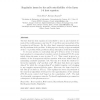Free Online Productivity Tools
i2Speak
i2Symbol
i2OCR
iTex2Img
iWeb2Print
iWeb2Shot
i2Type
iPdf2Split
iPdf2Merge
i2Bopomofo
i2Arabic
i2Style
i2Image
i2PDF
iLatex2Rtf
Sci2ools
156
Voted
SCL
2011
2011
Regularity issues for the null-controllability of the linear 1-d heat equation
The fact that the heat equation is controllable to zero in any bounded domain of the euclidean space, any time T > 0 and from any open subset of the boundary is well known. On the other hand, numerical experiments show the ill-posedness of the problem. In this paper we develop a rigorous analysis of the 1−d problem which provides a sharp description of this ill-posedness. To be more precise, to each initial data y0 ∈ L2(0, 1) of the 1−d linear heat equation it corresponds a boundary control of minimal L2(0, T)−norm which drives the state to zero in time T > 0. This control is given by a solution of the homogeneous adjoint equation with some initial data ϕ0, minimizing a suitable quadratic cost. Our aim is to study the relation between the regularity of y0 and that of ϕ0. We show that there are regular data y0 for which the corresponding ϕ0 are highly irregular, not belonging to any negative exponent Sobolev space. Moreover, the class of such initial data y0 is dense i...
| Added | 17 Sep 2011 |
| Updated | 17 Sep 2011 |
| Type | Journal |
| Year | 2011 |
| Where | SCL |
| Authors | Sorin Micu, Enrique Zuazua |
Comments (0)

